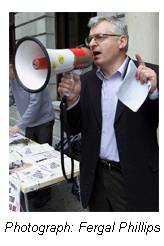|
By Brian Dowling, Irish Political Editor
ONE in five Irish people consider themselves to be rebels, according to new research commissioned by the government. Most protesters are well-to-do and middle-aged, the survey has also shown.

The findings confirm the existence of a large protest vote, which helped defeat the Nice treaty and is boosting support for radical politicians. The trend is causing increasing concern to mainstream political parties, who face a general election and a second Nice referendum in the next year.
The findings emerged in a nationwide survey on attitudes to and awareness of the government's flagship £40 billion National Development Plan
(NDP). The survey will be published by the government later this week.
Asked if they ever protested on a local issue, 22% said yes while 18% said they had protested on a national issue. Of those, nearly one in three (28%) were from the AB social group, the middle classes.
One in 10 said they would certainly protest on an issue that directly affected their family or area, while 27% indicated they would be likely to protest.
The results indicate that about one in five Irish people have campaigned or protested at either local or national level and are ready to do so again. This proves the existence of a substantial Nimby (not in my back yard) constituency, which has implications for government policy on traveller accommodation, incineration and infrastructure development.
Protesters do not conform to the stereotype of being young and duffel-coated. Instead they are most likely to be aged 45-55 and from well-to-do backgrounds. The survey found those most likely to campaign are middle-aged parents in Dublin, Cork and Kerry. duffel-coated. Instead they are most likely to be aged 45-55 and from well-to-do backgrounds. The survey found those most likely to campaign are middle-aged parents in Dublin, Cork and Kerry.
The research on the NDP also reveals a more general attitude of distrust or cynicism towards politics. For instance, 18% of those polled expressed concern that the money allocated in the NDP might not be used as intended. There appears to be an underlying concern that ministers might decide to spend the money differently if political circumstances demanded it. The research found that while half the country is ready to accept major infrastructural projects, one in five say their support is conditional, depending on local impact and cost.
For the main political parties, this all suggests a rich vein of potential discontent that can be exploited at local level by smaller parties and independents. The findings will fuel the concerns among the government and main opposition parties that public cynicism with politics is resulting in apathy or driving people to support smaller parties, independents and single issue candidates.
Many government sources said the findings underline the "anti-establishment" message that was evident in the rejection of the Nice treaty. That campaign, which badly shook the government, involved small and diverse political and issue-based groups aligning themselves as a force to defeat the efforts of all the main parties that backed the treaty.

Even before the Nice referendum campaign, senior strategists in the main parties were predicting that independent and protest candidates could have a decisive impact on the outcome of the next general election. Their worry is that these candidates could make it more difficult to win second and third seats when transfers are crucial.
Martin Cullen, one of the ministers centrally involved in the NDP, will launch the survey on Wednesday. It was carried out by Drury Communications between February and May.
The government launched the NDP at the end of 1999 with a fanfare of publicity. It heralded the biggest programme of public spending on infrastructure such as roads, public transport and water treatment since the foundation of the state. Unlike previous plans, the vast majority of the funds will come from the Irish exchequer. Of the £40 billion only £4 billion comes from Brussels.
The Sunday Times
News Page 5
Sunday 19th August 2001
www.sunday-times.com
|